- Home
- Patrick O'Brian
Men-of-War Page 3
Men-of-War Read online
Page 3
Our young commander was born lucky. He has his sloop in a month or two – she takes a French corvette of equal force and he is promoted again. He is posted into a frigate, for he is now a post-captain. As a commander he was called Captain Blockhead by courtesy, and of course he was the captain of his ship; but now he is a full-blown captain and he is so addressed in official letters by the Admiralty. This time he does not have to buy a new uniform: his old coat will do, and all that is needed is to shift his epaulette from his left shoulder to his right, with the comforting reflection (if his promotion is before 1812) that when he is a captain of three years’ seniority he will wear two, one on each shoulder, and the even more comforting reflection that from now on his promotion is automatic. Many of his former shipmates have stuck at lieutenant, many at commander, but the post-captains move steadily up the list, and now nothing but death or very shocking misconduct will prevent him from being an admiral at last. After some years in frigates he is given a ship of the line, and slowly he climbs the captains’ list until at last he is at the top. The oldest of all the full admirals dies, and everyone moves up a step – our post-captain is made a rear-admiral! There is one last anxiety in his mind, however: he may be given no flag – he may be only a ‘yellow admiral’, condemned to live the rest of his life ashore on half-pay. But his luck still holds, and not only is he made rear-admiral of the blue but he is given a squadron to command. He goes aboard his flagship, hoists his blue ensign at the mizen; the squadron salutes it with thirteen guns and they proceed to sea. (The Navy never goes: it always proceeds.) But however well he fights it makes no difference to his promotion. He moves up the flag-list automatically – no one can get ahead of him and he cannot get ahead of anyone else, no matter what victories he may win. Rear-admiral of the blue, of the white, of the red. (In the seventeenth century, when very numerous fleets were engaged in the Dutch wars, the British fleets were divided into three squadrons, the red in the centre, the white in the van and the blue in the rear; and each squadron had its own admiral, vice-admiral and rear-admiral, the admiral of the red squadron being the admiral of the fleet.) Then vice-admiral of the blue, the white, hoisting his white ensign at the fore (this was the highest rank that Nelson ever reached), and of the red. Then admiral, full admiral: and at last, an old, old, very old man, he hoists the union flag at the main, for he is the most senior of them all, the admiral of the fleet.
I have spoken of other officers in the ward-room, the master, the surgeon and the purser: they messed in the ward-room and they had the right to walk the quarterdeck, but they were not commissioned officers – they held a warrant from the Navy Office and they never had quite the standing of the others. The master was a relic from the times when sailors sailed the ships and soldiers did the fighting, and he was still responsible for the navigation; he usually began as a midshipman, became a master’s mate, and then, having few social advantages and no influence, gave up all hope of a commission, accepted a warrant and so reached the highest rank that he was ever likely to attain. The surgeon was the ship’s medical man, of course; and the purser looked after the ship’s provisions and the slops, or clothes that were sold to the men at sea; he had almost nothing to do with pay. The purser was not often a popular officer, and ‘pusser’s tricks’ meant any kind of swindle with food, drink, tobacco and clothes, the most notorious being ‘purser’s eights’, or his habit of receiving food at sixteen ounces to the pound and serving it out at fourteen, keeping the odd two for himself.
There were other warrant officers, such as the boatswain, who looked after the rigging, sails, anchors, cables and cordage, and who hurried the men to their duty, and the gunner and the carpenter, who were of great importance in the life of the ship: they usually rose from the lower deck, and they messed by themselves, not in the ward-room.
The lower deck itself was made up of the great mass of the ship’s people – all the ratings from boy, third class (the lowest form of marine life) to able seaman. The captain appointed the petty officers such as the quartermasters, ship’s corporal, boatswain’s mate and so on from among them, but it made little difference to their sense of being the same kind of men. They nearly all lived and messed together on the lower deck between the guns, slinging their hammocks from the low beams overhead. They were allowed fourteen inches a man, but as they were divided into two watches, larboard and starboard, each on duty in turn, they usually had the luxury of twenty-eight inches to lie in: some 500 men packed into a space about 150 feet long and 50 at the widest. Their life was very hard, often dangerous, and always ill-paid; what is more, their meagre pay was invariably kept six months in arrears, in the hope that this would prevent them from running away. If their food had been good in the first place and if it had been honestly served out and decently cooked, it would not have been too bad by the standards of the time; but generally this was not the case. Indeed, it was usually so bad that when they could catch them, the men often ate rats, or millers as they were called in the service, because of their dusty coats as they got into the flour and dried peas. They were neatly skinned and cleaned and laid out for sale: hungry midshipmen would buy them too, and Admiral Raigersfeld, looking back on his youth, says, ‘They were full as good as rabbits, although not so large.’ Speaking of the bread he observes, ‘The biscuit that was served to the ship’s company was so light, that when you tipped it upon the table, it almost fell into dust, and thereout numerous insects, called weevils, crawled; they were bitter to the taste, and a sure indication that the biscuit had lost its nutritious particles; if instead of these weevils, large white maggots with black heads made their appearance (these were called bargemen in the Navy), then the biscuit was considered to be only in its first state of decay; these maggots were fat and cold to the taste, but not bitter.’
Here is a list of the provisions that were usually served out:
Sunday, 1 lb of biscuit, 1 lb of salt pork, half a pint of dried peas.
Monday, 1 lb of biscuit, half a pint of oatmeal, 2 oz of sugar and butter, 4 oz of cheese.
Tuesday, 1 lb of biscuit, 2 lb of salt beef.
Wednesday, 1 lb of biscuit, half a pint of peas and oatmeal, 2 oz of butter and sugar.
Thursday, 1 lb of biscuit, 1 lb of pork, half a pint of peas, 4 oz of cheese.
Friday, 1 lb of biscuit, half a pint of peas and oatmeal, sugar, butter and cheese as before.
Saturday, 1 lb of biscuit and 2 lb of beef.
When beer was to be had, they were given a gallon a day; when it was not, which was most of the time, they had their beloved grog. This was rum, mixed with three times the amount of water and a little lemon-juice against scurvy: they were given a pint of grog at dinner time and another for supper, and they often got dead drunk, particularly when they saved up their rations and drank it all at once.
They were nearly always uneducated, often unable to read or write, and they had generally lived very hard all their lives; but there were some wonderful men among them, brave, very highly skilled at their calling, magnificently loyal to their shipmates and to their officers if they were well led. As Nelson said, ‘Aft the more honour, forward the better man.’ By aft he meant the quarterdeck, abaft the mainmast, the officers’ part of the ship, and by forward he meant the men, the foremast jacks, who lived forward of the mainmast.
They were brought together partly by free entry (popular officers like Saumarez or Cochrane could always man their ships with volunteers) and partly by the press-gang. Impressment was a rough and ready form of conscription, and the idea was that seamen should be taken from merchant ships or seized on land and compelled to serve in the fleet for as long as their services were required. In practice it meant that a short-handed ship (and a man-of-war needed an enormous crew – roughly ten times the size of a merchantman’s) would send an officer ashore with a strong party of powerful, reliable sailors armed with pistols and cutlasses for show and clubs for use to catch any reasonably able-bodied man they could lay their hands on – seamen for choice but a
nyone who could haul on a rope if sailors were not to be found. There was also the impress service itself, where shore-based officers did much the same, sending their prey to receiving ships, whence they were drafted to the men-of-war. Then, in 1795, there was the quota-system, by which each county was required to provide so many men for the Navy. The counties responded by getting rid of their undesirables – thieves, poachers, paupers, general nuisances, nearly all of them landsmen, or as the men-of-war’s men called them, grass-combing lubbers.
Faced with recruits of this kind, some of them straight from gaol, many officers tightened the already severe discipline of their ships: flogging became more frequent and more savage, and ‘starting’, hitting people with a cane or a rope’s end, to make them jump to their work, grew far worse. The real seamen came in for a good deal of this, and they began to feel even more ill-used, particularly as these alleged volunteers, who were sometimes given the choice between transportation and the Navy, received a bounty of as much as £70 – well over four years’ pay for an able seaman. The sailors were ill-used, they were knocked about, they were not paid at all when they were sick or wounded and off duty, their pay was always in arrears, they were allowed almost no shore-leave at home, and they were cheated out of their rations. At Spithead in 1797 they mutinied. This was a very important mutiny, not like the small though sometimes bloody outbreaks against a tyrannical brute of a captain: the men refused to take the fleet to sea unless their grievances were put right. They were extraordinarily moderate, merely petitioning the Admiralty, in the most respectful terms, for an increase in pay to bring their nineteen shillings a month up to the soldier’s shilling a day, that their pound of provisions should be sixteen ounces, that fresh vegetables, instead of flour, should be served out when they were in port, and that they might be allowed a short leave to visit their families. They said they should certainly take their ships to sea if the French fleet came out; but until then they should stand by their demands. Nelson, among other officers, stated that ‘his heart was with them’ and that he was against ‘the infernal system’ of paying them by ticket rather than cash, so that they often had to leave their families penniless for years. In the end the Admiralty gave way; a bill was hurried through parliament, the mutineers were given the King’s pardon, and they carried Lord Howe, the admiral who had conducted the negotiations, shoulder-high through the streets of Portsmouth.
Before giving a table showing the pay of the Navy after these improvements and after some rises for the officers too, I will quickly run through the stations and duties of the crew. The older, most highly skilled able seamen were stationed on the forecastle; they were called sheet-anchor or forecastle-men, and there would be about 45 of them in a 74. Then came the topmen, all able seamen, but young and active, since all the duty above the lower yards fell to them: counting fore, main and mizen topmen, there would be 114 altogether. Then came the afterguard, mostly ordinary seamen and landmen, who worked the after-braces, main, mizen and lower stay-sails: they would number about 60. Lowest of all in public esteem were the waisters, a numerous body (115) of landmen and other poor creatures stationed in the waist to look after the main and fore sheets and do all the dirty, unskilled work that was going. Then there were the quartermasters, old, reliable seamen who conned the ship, directing the helmsman; and the quarter-gunners, each of whom had charge of four guns. Last there were the idlers, or people who did not keep a watch but only worked from dawn till eight at night, such as the master-at-arms, the cook, the sailmaker, the barber and so on.
Pay (per lunar month – there are 13 lunar months in a year)
Life at Sea
Officially the ship’s day ran from noon to noon, but to most of those aboard it seemed to begin about dawn or earlier, just before eight bells in the middle watch, or 4 a.m., when the boatswain’s mates piped ‘All hands’ down the fore and main hatchways and hurried below roaring ‘Larboard watch ahoy! Rise and shine. Show a leg there! Out or down, out or down. Rouse out, you sleepers,’ and cutting down the hammocks of those who preferred to stay in bed, having had no more than four hours of sleep.
The business of the ship, when at sea, had to go on right round the clock, naturally, since she could not be tied up to a post for the night; and to deal with this situation the ship’s company was divided into two watches, larboard (or port) and starboard, and the 24 hours were cut into seven periods of duty, also called watches, thus:
Noon to 4 p.m., afternoon watch
8 p.m. to midnight, first watch
4 p.m. to 6 p.m., first dog-watch
midnight to 4 a.m., middle watch
6 p.m. to 8 p.m., last dog-watch
4 a.m. to 8 a.m., morning watch
8 a.m. to noon, forenoon watch.
The odd number of watches meant that the night duty was fairly shared: the larboard watch would turn out at midnight one day and the starboard the next. But the two-watch system also meant that most of the men never had more than four hours’ sleep at a time. The officers were divided into three watches, which gave them longer in bed, but on the other hand they were never allowed to sleep on duty whereas in calm weather the men who were not at the wheel or looking out might drowse in most ships when there was nothing to be done. The passage of time was marked by strokes on the ship’s bell, one stroke for every half hour: so eight bells meant the end of the ordinary watch. And at every stroke the log was heaved, the speed of the ship and her course marked on the log-board, and the depth of water in the well reported by the carpenter or one of his mates, while at night all the sentinels called ‘All’s well.’
To go back to eight bells in the middle watch: as they were struck, so the watch that had been sleeping, the larboard watch, let us say, was mustered and the watch on duty dismissed to get what sleep they could before hammocks were piped up. About this time the idlers or day-men were called, and at two bells the decks were cleaned, first being wetted, then sprinkled with sand, then scrubbed with holystones great and small, then brushed, and lastly dried with swabs. This took until six bells, and at seven bells hammocks were piped up. Each man took his hammock (it had a number on it, corresponding with the number on the beam where it was slung), rolled it into a tight cylinder and brought it up on deck, where the quartermasters stowed them in the hammock-nettings along the sides: this aired the bedding after the awful fug below, provided some protection in case of battle (a hammock would stop a musket-ball and deaden a cannon-ball), and cleared the lower deck for cleaning.
At eight bells in the morning watch hands were piped to breakfast, which was biscuit, burgoo (a kind of milkless porridge) and, in some ships, cocoa. Half an hour was allowed for this feast. Now it was the forenoon watch and the starboard men were on duty again (the two watches were often called the larbowlines and starbowlines). The watch below cleaned the lower deck, with water if the weather was fine and the ports could be opened to dry the planks, otherwise with dry sand, holystones and brooms; then they might be allowed to rest, but some captains preferred them to exercise the great guns or to practise reefing topsails.
At eight bells in the forenoon watch the officers took the noon observations of the sun to fix the ship’s position, the watch was changed and all hands piped to dinner. The men divided themselves into messes, usually of eight friends, and one of the eight was appointed their cook for the day: he received the mess’s ration from the ship’s cook in the galley, saw to its dressing and brought it to his messmates as they sat at their hanging table between the guns. It took about half an hour to eat, and then at one bell the fifer on the main deck began to play ‘Nancy Dawson’ or some other tune that meant the grog was ready. The cooks darted up the ladder with little tubs or blackjacks to the butt where the master’s mate had publicly mixed the rum, water and lemon-juice. He served it out with great care, and with great care the cooks carried it down, while their messmates banged their plates and cheered. It was shared out, but in tots slightly smaller than the tot the officer had used, so that a little was left ove
r: this was called the cook’s plush, and he drank it as a reward for his trouble.
At two bells dinner was over: the larbowlines were on duty, and generally the starbowlines were turned up as well for exercise. At six bells in the afternoon watch, or 4 p.m., hands were piped to supper, which was much the same as breakfast, but with another issue of grog. Supper took half an hour; by this time it was one bell in the first dog-watch, and a little later the drum beat to quarters. All hands hurried to their action-stations and the guns were cast loose. The midshipmen and then the lieutenants inspected the men under their charge and eventually the first lieutenant, having received their reports, reported ‘All present and sober, sir, if you please,’ to the captain, who would then have the guns run in and out and perhaps fired, or topsails reefed or furled and loosed.
When this was over the drum beat the retreat, hammocks were piped down, and at eight bells the watch was set. The larboard watch went below, straight to sleep; lights were put out on the lower deck, and the starboard watch took up its duty. At eight bells the larbowlines were called again for the middle watch, and four hours later, towards dawn, the day began again with the cleaning of the decks, this time by the starboard watch.

 The Final Unfinished Voyage of Jack Aubrey
The Final Unfinished Voyage of Jack Aubrey The Rendezvous and Other Stories
The Rendezvous and Other Stories Caesar: The Life Story of a Panda-Leopard
Caesar: The Life Story of a Panda-Leopard The Hundred Days
The Hundred Days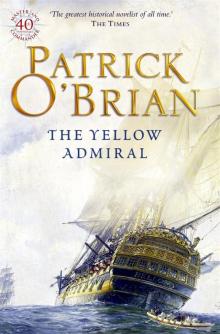 The Yellow Admiral
The Yellow Admiral The Fortune of War
The Fortune of War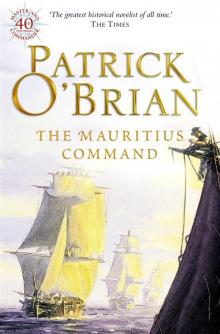 The Mauritius Command
The Mauritius Command Beasts Royal: Twelve Tales of Adventure
Beasts Royal: Twelve Tales of Adventure A Book of Voyages
A Book of Voyages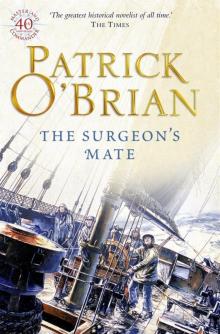 The Surgeon's Mate
The Surgeon's Mate The Golden Ocean
The Golden Ocean Hussein: An Entertainment
Hussein: An Entertainment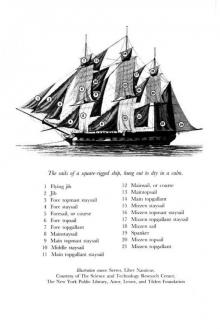 H.M.S. Surprise
H.M.S. Surprise The Far Side of the World
The Far Side of the World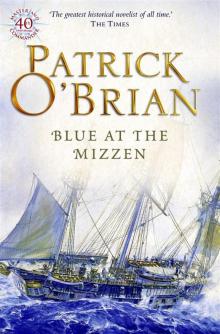 Blue at the Mizzen
Blue at the Mizzen The Unknown Shore
The Unknown Shore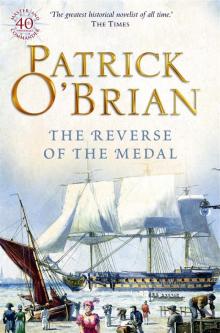 The Reverse of the Medal
The Reverse of the Medal Testimonies
Testimonies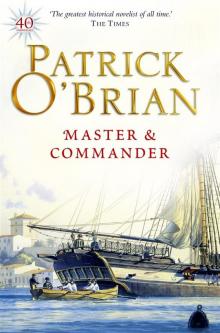 Master and Commander
Master and Commander The Letter of Marque
The Letter of Marque Treason's Harbour
Treason's Harbour The Nutmeg of Consolation
The Nutmeg of Consolation 21: The Final Unfinished Voyage of Jack Aubrey
21: The Final Unfinished Voyage of Jack Aubrey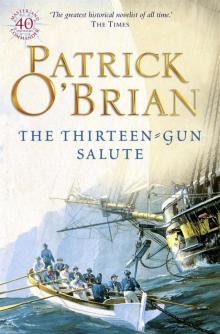 The Thirteen-Gun Salute
The Thirteen-Gun Salute The Ionian Mission
The Ionian Mission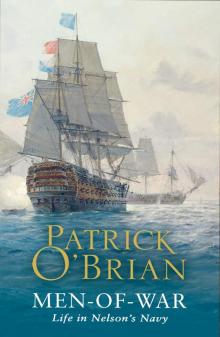 Men-of-War
Men-of-War The Commodore
The Commodore The Catalans
The Catalans Aub-Mat 08 - The Ionian Mission
Aub-Mat 08 - The Ionian Mission Post Captain
Post Captain The Road to Samarcand
The Road to Samarcand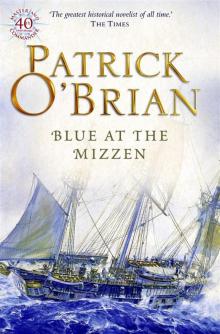 Book 20 - Blue At The Mizzen
Book 20 - Blue At The Mizzen Book 14 - The Nutmeg Of Consolation
Book 14 - The Nutmeg Of Consolation Caesar
Caesar The Wine-Dark Sea
The Wine-Dark Sea Book 8 - The Ionian Mission
Book 8 - The Ionian Mission Book 12 - The Letter of Marque
Book 12 - The Letter of Marque Hussein
Hussein Book 9 - Treason's Harbour
Book 9 - Treason's Harbour Book 19 - The Hundred Days
Book 19 - The Hundred Days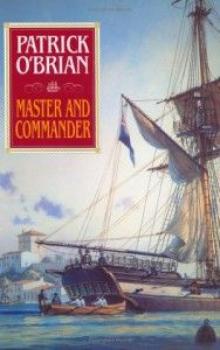 Master & Commander a-1
Master & Commander a-1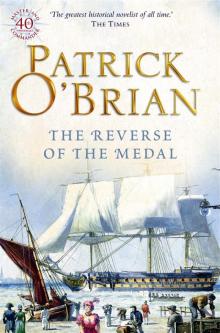 Book 11 - The Reverse Of The Medal
Book 11 - The Reverse Of The Medal Book 2 - Post Captain
Book 2 - Post Captain The Truelove
The Truelove The Thirteen Gun Salute
The Thirteen Gun Salute Book 17 - The Commodore
Book 17 - The Commodore The Final, Unfinished Voyage of Jack Aubrey
The Final, Unfinished Voyage of Jack Aubrey Book 10 - The Far Side Of The World
Book 10 - The Far Side Of The World Book 5 - Desolation Island
Book 5 - Desolation Island Beasts Royal
Beasts Royal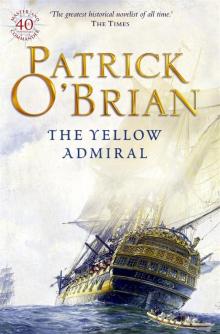 Book 18 - The Yellow Admiral
Book 18 - The Yellow Admiral Book 15 - Clarissa Oakes
Book 15 - Clarissa Oakes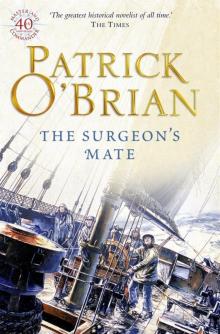 Book 7 - The Surgeon's Mate
Book 7 - The Surgeon's Mate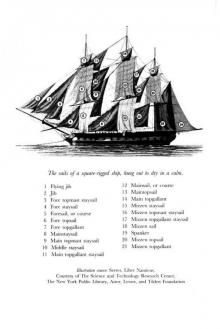 Book 3 - H.M.S. Surprise
Book 3 - H.M.S. Surprise Desolation island
Desolation island Picasso: A Biography
Picasso: A Biography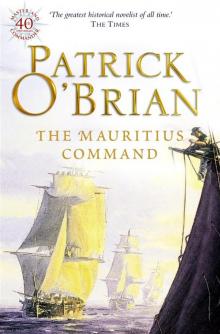 Book 4 - The Mauritius Command
Book 4 - The Mauritius Command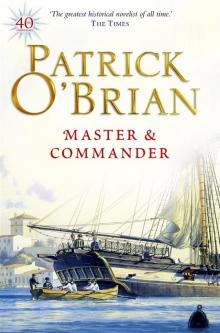 Book 1 - Master & Commander
Book 1 - Master & Commander Book 6 - The Fortune Of War
Book 6 - The Fortune Of War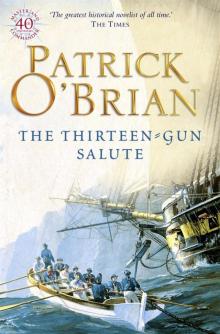 Book 13 - The Thirteen-Gun Salute
Book 13 - The Thirteen-Gun Salute Book 16 - The Wine-Dark Sea
Book 16 - The Wine-Dark Sea